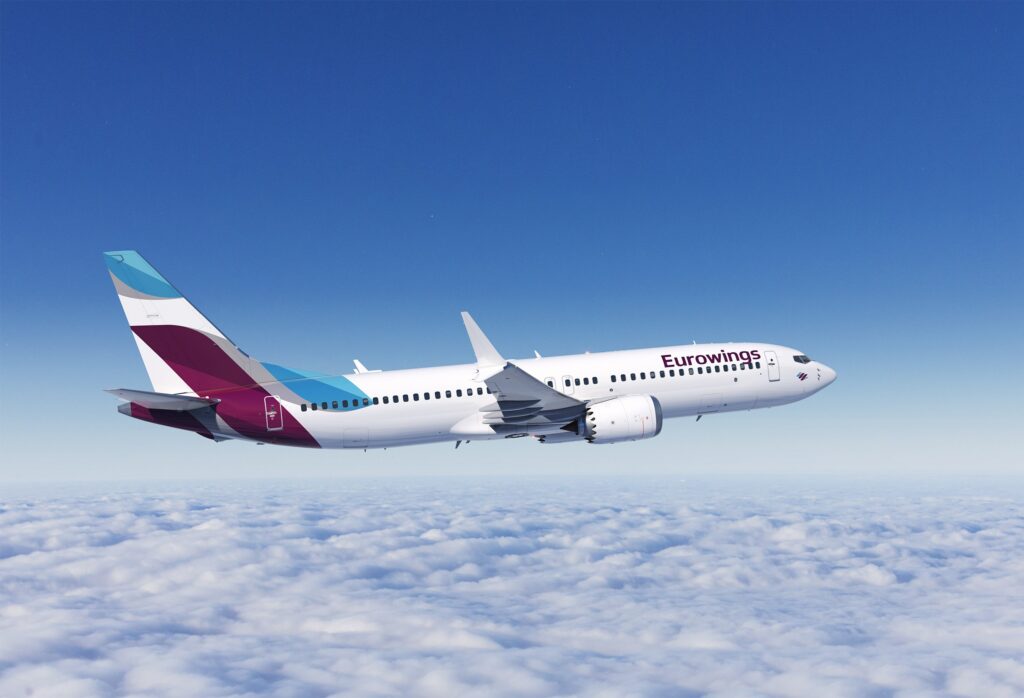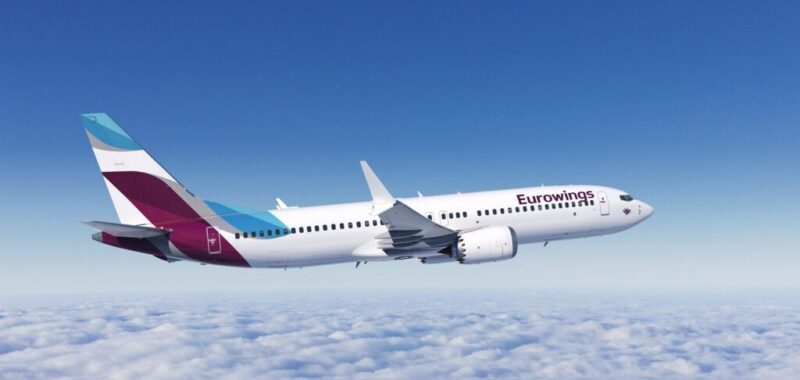
Major changes are coming to one of Europe’s largest low-cost carriers. On Monday, the Lufthansa Group confirmed that 40 Boeing 737 Max 8s are heading for Eurowings. The airline is a wholly owned subsidiary of the German aviation giant.
The development is significant given that Eurowings currently operates an all-Airbus fleet. The carrier has around 80 planes, spanning the A319, A320, and A321. It will use the new aircraft to phase out the A319 – the smallest of its current roster – and older A320 models.
This suggests that Eurowings will soon become a hybrid Airbus and Boeing operator.
Notably, this is not a like-for-like swap. The Max 8 can carry 189 passengers – 39 more than the outgoing A319s. It can also fly further, bringing a broader range of medium-haul destinations into reach. Eurowings described the agreement as “one of the largest fleet modernizations in European aviation.”
List Price of $5 Billion
The prospect of a new Boeing operator will delight the U.S. manufacturer, however, Monday’s announcement will not directly result in additional revenue for the plane-maker.
Eurowings is sourcing the new Max jets via a previously announced deal between Lufthansa Group and Boeing. While the list price for 40 737 Max 8s is approximately $5 billion, airlines usually get large discounts when ordering in bulk.
The strategy of parent companies purchasing aircraft and deciding which brand to give them to is becoming increasingly popular.
IAG – the owner of flag carriers including Iberia, British Airways, and Aer Lingus, followed a similar approach with recent orders from Airbus and Boeing. This often sees individual airlines make their case internally to senior executives. A decision is then taken to consider the best return on investment for the new planes.
Hinting at this strategy, Lufthansa Group CEO Carsten Spohr said on Monday that the allocation was “well-deserved.”
“The company’s strategic focus on expanding its tourism business and its consistent expansion in Europe is paying off for the entire Lufthansa Group. Our decision today is a well-deserved and strong signal for a successful future of Eurowings,” Spohr added.
A Sustainability Project?
In a statement, Eurowings described the new aircraft as the “largest and most expensive sustainability project” in its history. The 737 Max uses up to 30% less fuel than older generation planes, but this also has major financial savings for the airline. Any positioning of the benefits of new aircraft in environmental terms alone is likely to raise eyebrows.
Speaking on Monday, Jens Bischof, Eurowings chief executive, described the “responsibility to reconcile economic and ecological topics.”
Eurowings’ A319s will have an average age of approximately 20 years by the time they are replaced. European low-cost rivals such as Ryanair, easyJet, and Wizz Air typically operate much younger fleets, allowing them to leverage improved fuel efficiency.
“Without such a technological leap, an airline will hardly be able to operate successfully on the market in the 2030s,” added Bischof.
By most metrics, Cologne-based Eurowings is Germany’s largest leisure airline. Unlike Lufthansa’s mainline operation, its business model focuses on point-to-point traffic, avoiding busy hubs in Munich and Frankfurt.
The first of the new Eurowings aircraft is due to be delivered in 2027. Based on current delivery schedules, all 40 planes will be handed over by 2032.
Executives at Eurowings and the Lufthansa Group will be monitoring progress at Boeing closely. In recent years the plane maker has experienced significant disruption to its production, resulting in public put-downs from several high-profile airline CEOs.
Pegasus’ Blockbuster Boeing Order
The welcome news of new Boeing operator in Germany follows a positive end of 2024 for Boeing. In December, Turkish low-cost airline Pegasus announced a major overhaul of its fleet with a firm order for 100 of the larger 737 Max 10 variant. The contract also allows the carrier to buy up to 100 more at a later date.
Apart from its size, last month’s Pegasus deal is notable for another reason. The Turkish carrier currently has just nine Boeing planes in a fleet of almost 120. All of the others are A320 and A321 jets made by European rival Airbus.
Pegasus management will have calculated that the significant retraining, technical, and logistical complexities of switching manufacturers are outweighed by the benefits.
The first of Pegasus’ 100 737 Max 10s is due for delivery in 2028.
Airlines Sector Stock Index Performance Year-to-Date
What am I looking at? The performance of airline sector stocks within the ST200. The index includes companies publicly traded across global markets including network carriers, low-cost carriers, and other related companies.
The Skift Travel 200 (ST200) combines the financial performance of nearly 200 travel companies worth more than a trillion dollars into a single number. See more airlines sector financial performance.
Read the full methodology behind the Skift Travel 200.

